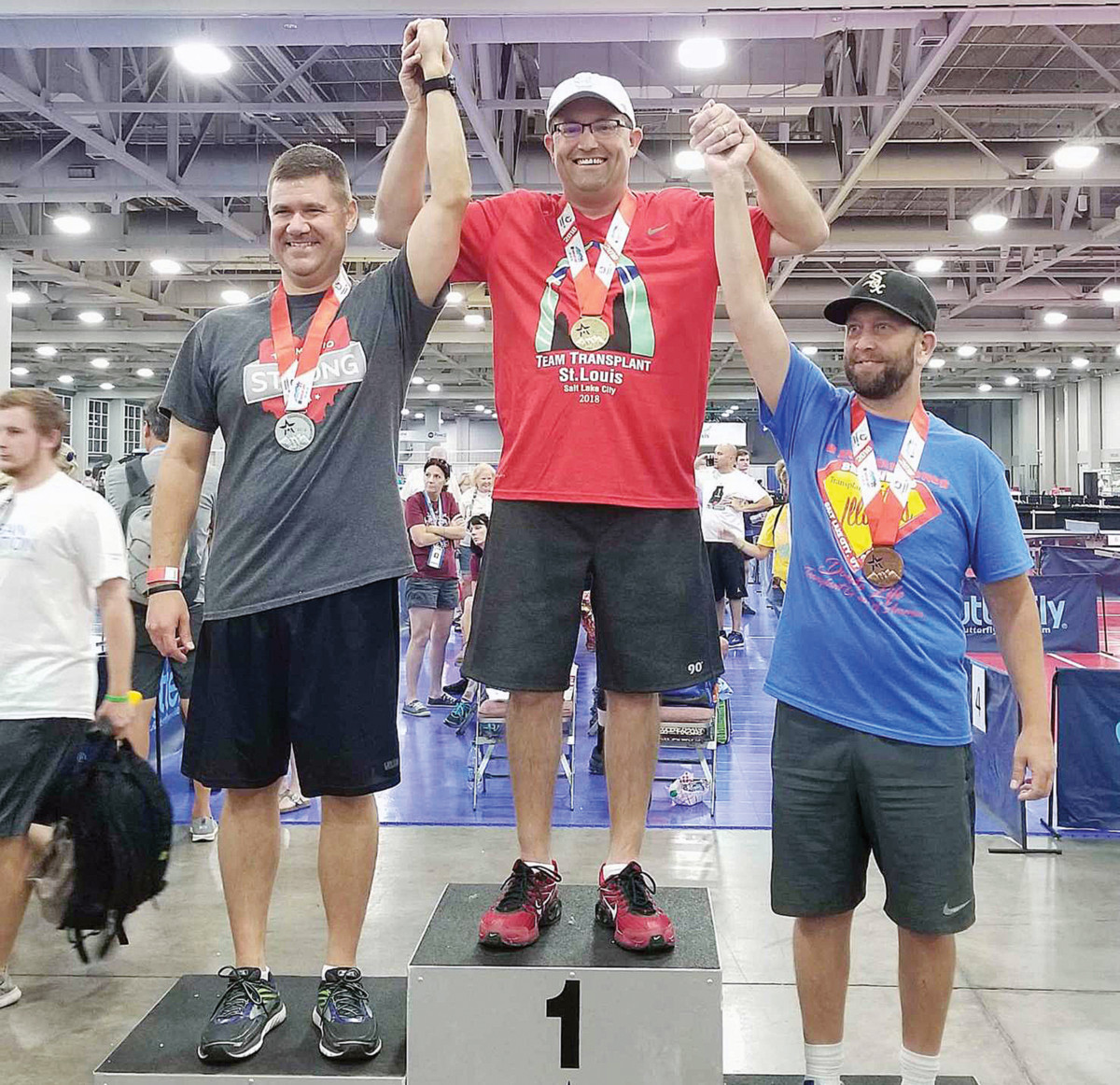Kidney donated by Holy Family parishioner
By SUZANNE KOZIATEK
Staff writer
John Reed just made a triumphant return to the Metro East, bearing a gold medal he won in the 2018 Transplant Games of America in Salt Lake City.
The road to that victory – and to the life-changing kidney transplant he received four years ago – ran through Holy Family Catholic Church in Cahokia. That’s where his parents, John and Dee, are members and where their fellow parishioner, Kathy Carron, learned about his need for a kidney donor.
Reed, 45, lost the use of his kidneys as the result of a genetic disease called Alport Syndrome. In 1995, he received a kidney donation from his aunt, Mary Reed. After that donation, John Reed, who had been an athlete at Holy Family and Althoff schools, was happy to celebrate his newfound health by competing in the Transplant Games of America, an event that draws together recipients of life-saving transplanted organs to compete in Olympic-style sports competitions.
He competed in the 1996, 1998 and 2000 games, playing table tennis, golf, team basketball and team volleyball, and brought home several medals. But his Transplant Games career was interrupted in the worst possible way – in 2001, his transplanted kidney failed, and he began the long and difficult search for a new donor.
That search would last for 13 years, during which he received regular dialysis treatments. The earlier transplant had caused his body to develop antibodies that made it harder for him to find a good match this time around.
Carron heard about Reed’s predicament through the grapevine at Holy Family. It wasn’t the first time she’d considered a kidney donation. Several years earlier, she says, another parishioner at Holy Family was searching for a kidney donor.
“The thought of getting tested (to see if she was a match) crossed my mind, but I never did anything about it,” she says. “So when I heard about John, I was interested right away and decided I wanted to be tested.
“I knew he had a son, about 8 years old at the time,” Carron says. “I’ve got sons, and it killed me that he was spending so many hours tied to a dialysis machine when he should be outside with his kid. I thought, if I can help with that in any way, I want to do it.”
As it turned out, she wasn’t a match for Reed, but doctors suggested a different approach, what’s called a “paired kidney exchange.” In this type of donation, a donor who isn’t a match for his or her preferred recipient can instead be paired with another recipient. That person, in turn, has a designated donor who could be matched back to the original recipient.
These chains of donors and recipients can be extensive – Carron says she believes 12 pairs of donors and recipients were involved in the cross-country chain that bound her and Reed together. Carron’s kidney ended up going to a patient in New Jersey, and Reed’s new kidney came from a donor in Seattle.
Carron believes that there was a reason she never attempted to be matched to the first kidney patient at Holy Family. Reed’s situation was so complex that her contribution was needed more.
“Maybe I was supposed to wait,” she says. “As I understand it, our chain of 12 donors and 12 recipients was in place except for that last link – John and I completed the chain.”
With a successful second transplant, Reed has gone on to compete in two more Transplant Games, including the Salt Lake City games held earlier this month. He came back with a gold medal in table tennis, and helped Team Transplant St. Louis take the bronze in men’s basketball. In all, the 31-person team won more than 60 medals this year, 21 of them gold.
Reed says the games are a wonderful way to connect with other transplant recipients and with donors and their families. He met his own donor at this year’s games. “I met her on this trip with her son, who is two months older than my son,” Reed says. ]
“It really is a neat thing. Every two years, we get to reconnect with a lot of people from other teams, other states – even a few international teams. As long as I’m eligible to do it, I’ll keep going.”
He says the event helps increase awareness of the importance of organ donation – spotlighting living donors such as Carron and the families of deceased donors.
“It also raises awareness of the life that people can lead after getting a transplant,” Reed says.
Reed and Carron try to raise awareness in their own way. The two visited St. James Catholic School, in Reed’s Millstadt parish, to educate kids about organ donation.
Carron says she and Reed’s parents still occasionally talk about her gift to their son, especially around the anniversary of the operation in January. Reed gave her a gift in return: a Tiffany “bean” necklace, which he chose because it is shaped like the vital organ she gave him.
She says the experience reminds her to look for ways to impact other people’s lives.
“I haven’t had one second’s regret for doing it,” she says.
For information about organ donation visit midamericatransplant.org







